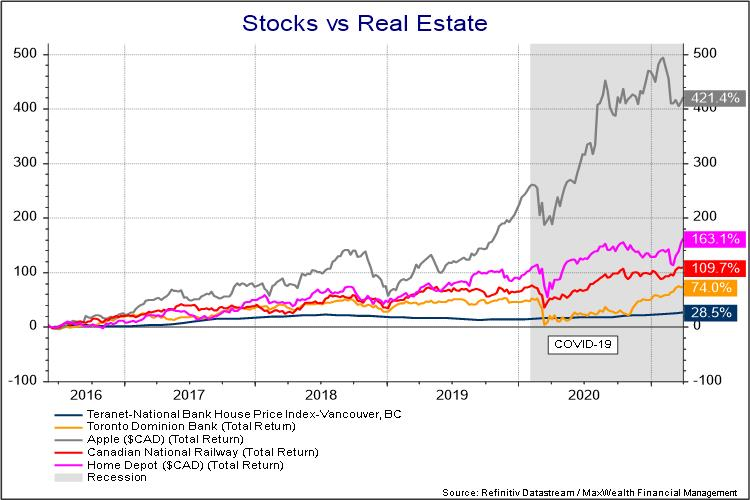Taking Stock of Wealth
It is a long-held belief that the only way to consistently build wealth is to invest in real estate. In this issue we wish to challenge that assumption, and to update a discussion that started a couple of year’s ago in our July 2019 edition. It’s easy to understand why an investor would champion local real estate: interest rates are historically low, property is a tangible thing, TV shows abound of savvy investors flipping houses to generate fortunes, and tales of bidding wars are within earshot. These factors drive up prices and people’s propensity to take uncalculated risks. But here’s the catch, real estate isn’t the best investment of the 21st century, businesses are!
To remain relevant, we conducted a 5-year lookback to compare the returns of a hot Vancouver real estate market to a few household businesses that we are all familiar with. A few points about the chart below before we start our analysis. All returns have been translated into Canadian dollars for a fair comparison. The stock returns are total returns meaning dividends have been reinvested. The end date of the analysis is April 1, 2021 to establish a common end-point for all figures. Finally, the Teranet House Price Index (HPI) is the most robust representation of single-family home prices in Canada.[1]

Here are our observations:
- Over the past five years businesses have vastly outperformed Vancouver real estate as measured by the above absolute percentages. For those of you concerned that we may have datamined, the divergence further increases as we extend out the timeframe. So, in other words, time is really our friend when we invest in good quality businesses and their outperformance shines as we extend the lookback period. Of course, the future may look different.
- The stocks were not cherry-picked to show a positive result. We literally picked companies that currently populate our portfolios or that we used to hold. We also made sure that they were in different industry groups to show breadth in the analysis. While not on this graph, we also added businesses that were low growth, like Loblaws (L), or composite ETFs, like the TSX 60 (XIU) and the results were promising.
- We made sure that a market correction was present in the timeframe as not to bias the results in a “bull market”. In fact, there were two significant drawdowns in the capital markets in the time period selected, 2019 and 2020. Furthermore, at the COVID-19 low on March 23, 2020, only one business (TD Bank) was lower than the Vancouver HPI. That shows resiliency.
Clearly, there are going to be some missing pieces to our analysis above. You may wonder about other real estate markets in Canada for example. We did run the analysis with a larger Canadian composite which includes 10 other regions. The results were very similar. I guess a case may be made for different forms of home ownership such as multi-family dwellings, but we are unaware of a reliable price index for Canada. What has not been factored-in are the carrying costs or commissions on stock ownership and real estate. As we all know, they are substantially higher for real estate ownership. A final point worth mentioning is the tax treatment of stock and real estate. Most people are familiar with the principal residence exemption for gains in personal home ownership. This is a fair argument for the favorable tax treatment of some forms of real estate. However, if we assume that we all need to live somewhere for a moment, investing in additional real estate is roughly equivalent to stock investing.
We realize that further objections can be raised, and nuances on location and selection of securities can skew the results, but the main conclusion is that local real estate, as an investible asset class, is not the gateway to superior investment returns. Does that mean that we can’t find an instance of someone beating the odds and getting 500% upside on a reno-and-flip? Of course not. Neither does it mean that someone couldn’t pick the next Peloton, at the right time, and become an instant millionaire. These are events on the extremes and not the experience of the average investor.
What we hope you will discover and explore is that there is another way to build wealth other than real estate ownership. The prudent acquisition of quality businesses represents an alternative that is hard to beat and justifiable in the numbers presented above.
The enclosed article expresses the opinions of writer, Patrick A. Choquette, and not necessarily those of Raymond James Ltd. (“RJL”). Statistics, factual data and other information are from sources believed to be reliable but accuracy cannot be guaranteed. It is furnished on the basis and understanding that Raymond James Ltd. is to be under no liability whatsoever in respect thereof. It is for information purposes only and is not to be construed as an offer or solicitation for the sale or purchase of securities.
This may provide links to other Internet sites for the convenience of users. Raymond James Ltd. is not responsible for the availability or content of these external sites, nor does Raymond James Ltd endorse, warrant or guarantee the products, services or information described or offered at these other Internet sites. Users cannot assume that the external sites will abide by the same Privacy Policy which Raymond James Ltd adheres to.
Information provided in the attached report is general in nature and should NOT be construed as providing legal, accounting and/or tax advice. Should you have any specific questions and/or issues in these areas, please consult your legal, tax and/or accounting advisor.
Information in this article is from sources believed to be reliable, however, we cannot represent that it is accurate or complete. It is provided as a general source of information and should not be considered personal investment advice or solicitation to buy or sell securities. The views are those of the author, Patrick Choquette, and not necessarily those of Raymond James Ltd. Investors considering any investment should consult with their Investment Advisor to ensure that it is suitable for the investor’s circumstances and risk tolerance before making any investment decision. Raymond James Ltd. is a Member - Canadian Investor Protection Fund.
[1] See https://housepriceindex.ca/ for further detail.




